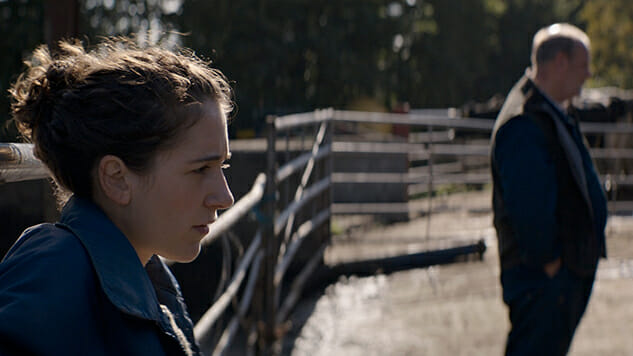The Levelling

There is a recurring bit of dream-like surrealism in Hope Dickson Leach’s debut feature The Levelling. It’s an image of a hare struggling to stay afloat in water, one in which, as captured by cinematographer Nanu Segal, the hare is suspended in ominously inky-black surroundings with only a pool of light shining from above. The symbolic connotations of the image are strikingly multifaceted: Not only does the water literally evoke the 2014 Somerset Levels floods that darkened the fortunes of Clover’s (Ellie Kendrick) father Aubrey’s (David Troughton) farm, but, more poetically, it evokes Clover’s own internal struggle to balance her desires (and those of her family) with their livelihood. The latter symbolic connotation comes to a head with the death of her brother, Harry (Joe Blakemore), who was set to take over the farm.
That twice-repeated image stands out in a film that otherwise sticks to an aesthetic of earthy naturalism: handheld camerawork, stationary shots framed behind doorways, dialogue scenes crackling with tension even in silences between characters. Despite its familiarity, that naturalism bears a primal force in keeping with the story Leach tells and the character dynamics she explores. The Levelling is, in part, about a character making gestures toward reacquainting herself with working on the land, and under Leach’s unsparing eye, farming life is presented in all its muddy, dirty griminess, punctuated by the occasional animal death. No wonder Clover—herself a vegetarian and a passionate animal-rights activist—desired to leave such a lifestyle behind in order to pursue her veterinary studies.
But as a kind of procedural, The Levelling is at its most gripping, especially when Clover discovers that Aubrey is most likely lying when he insists that Harry’s death was an accident, instead of the suicide that even the coroner concludes it is. Her discovery of the reasons for her father’s denial becomes the film’s main narrative thrust. Yet, even as she’s uncovering the mysteries surrounding her brother’s death, she’s also trying to unlock deeper psychological conundrums: of her father’s real attitude toward her, and, perhaps most importantly, of her thoughts and feelings about her family, their legacy and her potential place in it.